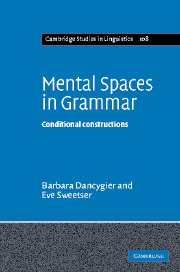Book contents
- Frontmatter
- Contents
- Acknowledgments
- Preface
- Note on abbreviated citations
- The door-scraper in the Wild Wood: an informal lesson in frame metonymy
- 1 Conditional constructions, mental spaces, and semantic compositionality
- 2 Prediction, alternativity, and epistemic stance
- 3 Tense, epistemic distance, and embedded spaces
- 4 Future and present forms in conditional constructions
- 5 Non-alternatives and alternatives: mental spaces in different domains
- 6 Then and even if: mental-space deixis and referential uniqueness
- 7 Clause order and space building: if, because, unless, and except if
- 8 Uniqueness and negative stance: only if and if only
- 9 Coordinate constructions and conditional meaning
- 10 The door-scraper in the Wild Wood: conditional constructions and frame-based space building
- References
- Author index
- Subject index
8 - Uniqueness and negative stance: only if and if only
Published online by Cambridge University Press: 22 September 2009
- Frontmatter
- Contents
- Acknowledgments
- Preface
- Note on abbreviated citations
- The door-scraper in the Wild Wood: an informal lesson in frame metonymy
- 1 Conditional constructions, mental spaces, and semantic compositionality
- 2 Prediction, alternativity, and epistemic stance
- 3 Tense, epistemic distance, and embedded spaces
- 4 Future and present forms in conditional constructions
- 5 Non-alternatives and alternatives: mental spaces in different domains
- 6 Then and even if: mental-space deixis and referential uniqueness
- 7 Clause order and space building: if, because, unless, and except if
- 8 Uniqueness and negative stance: only if and if only
- 9 Coordinate constructions and conditional meaning
- 10 The door-scraper in the Wild Wood: conditional constructions and frame-based space building
- References
- Author index
- Subject index
Summary
If only there was a camera that captured smells.
(AG. TB.197)Only, like the exceptive semantics of unless, conventionally and explicitly modifies the inferential structure of conditional space construction. These modifications in inferential structure affect the informational structure in ways which interact with the clause-ordering principles discussed in the previous chapter. The clause ordering further interacts with scopal relations of if and only, and with the polysemous semantics of only – making these constructions an ideal laboratory for the interaction of multiple parameters involved in grammatical space building.
Only if and if only take part in distinct constructions, each of which inherits structure from the basic if-conditional construction, but each of which also inherits or takes motivation from other orthogonal constructions. In addition, if only (in contrast with the more compositional only if), takes part in special constructions whose form and meaning are not compositionally predictable. Mental Spaces Theory, however, gives us convenient formal ways to express some of the contrasts between these two classes of constructions, and between each of them and central if-conditionals. We shall first examine only if.
Only if: space uniqueness and negative meaning
In understanding the combinatorial semantics of only and if, the first relevant factor is scope interaction. Only combines compositionally with sentence semantics in different ways depending on its scope relation to the clause. In the standard case of only if, only precedes and has scope over the entire adverbial if-clause constituent of the main clause.
Information
- Type
- Chapter
- Information
- Mental Spaces in GrammarConditional Constructions, pp. 204 - 236Publisher: Cambridge University PressPrint publication year: 2005
